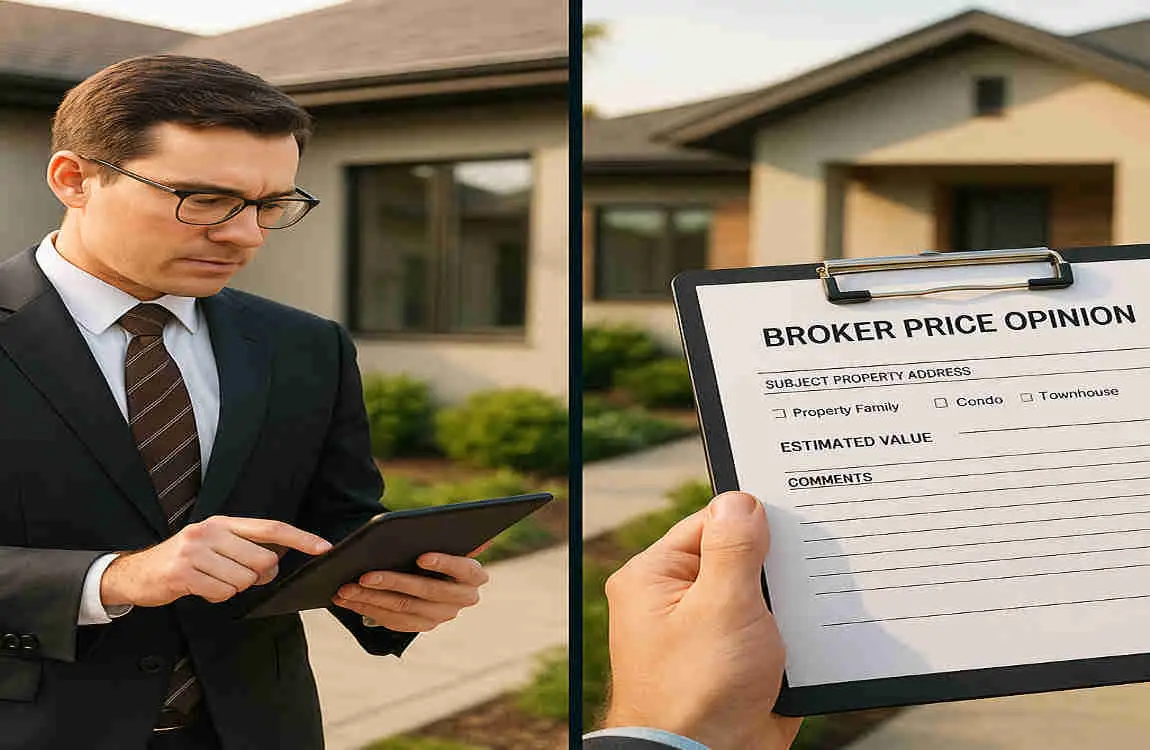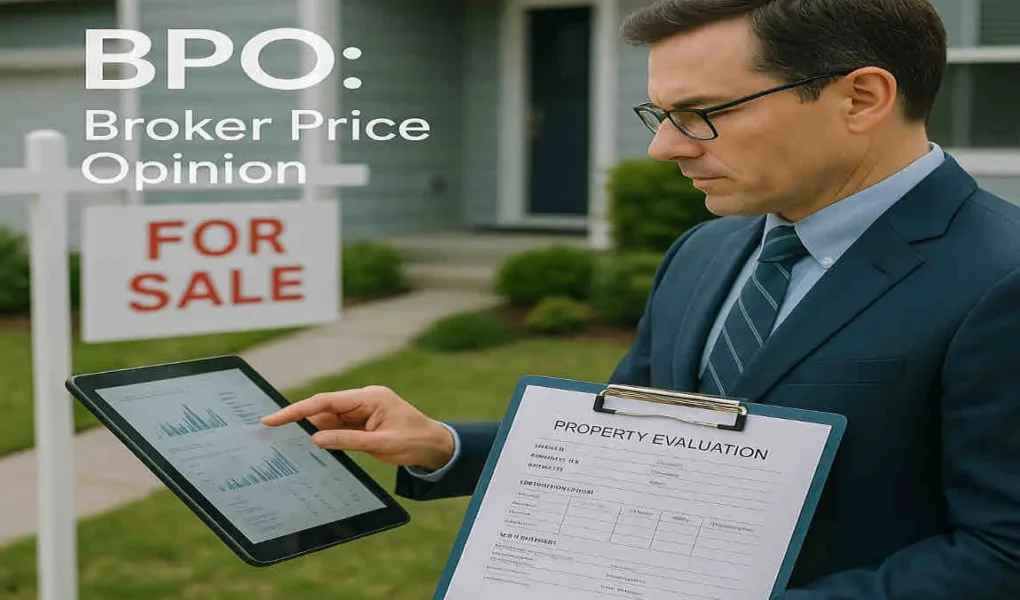When it comes to the world of real estate, understanding the value of your home is crucial. Whether you’re a homeowner looking to sell, a buyer searching for the perfect property, or an investor aiming to make wise decisions, knowing the true worth of a house can make all the difference. That’s where a real estate BPO, or Broker Price Opinion, comes into play.
What Is a BPO in Real Estate?

Defining a BPO
A BPO, or Broker Price Opinion, is a professional evaluation of a property’s value conducted by a licensed real estate broker or agent. It’s a tool used to estimate the market value of a home based on various factors, such as location, condition, and recent sales of comparable properties in the area.
How BPO Differs from Appraisals and CMAs
While a BPO may seem similar to an appraisal or a Comparative Market Analysis (CMA), there are key differences to keep in mind:
- Appraisal: An appraisal is a formal, detailed assessment of a property’s value conducted by a licensed appraiser. Lenders often require it for mortgage purposes, and it carries legal weight.
- CMA: A CMA is a report prepared by a real estate agent that compares the subject property to recently sold homes in the area. Agents commonly use it to help sellers determine a listing price.
- BPO: A BPO falls somewhere in between an appraisal and a CMA. It’s less formal than an appraisal but more detailed than a CMA. BPOs are often used by banks, lenders, and investors to assess a property’s value quickly and cost-effectively.
Types of BPOs: Interior vs. Exterior
There are two main types of BPOs:
- Interior BPO: This type of BPO involves a physical inspection of the property’s interior and exterior. The broker will assess the home’s condition, layout, and features to provide a more accurate valuation.
- Exterior BPO: An exterior BPO, on the other hand, only involves an assessment of the property’s exterior. This type of BPO is quicker and less expensive but may not provide as comprehensive a picture of the home’s value.
Who Requests a BPO and Why
BPOs are typically requested by banks, lenders, investors, and sometimes even homeowners. Here are some common scenarios where a BPO might be ordered:
- Short sales and foreclosures: Lenders may request a BPO to determine the value of a property before approving a short sale or proceeding with a foreclosure.
- Loan modifications: Banks may use a BPO to assess a property’s value when considering a loan modification or refinancing request.
- Investment decisions: Investors may order a BPO to help them make informed decisions about purchasing or selling a property.
- Homeowner curiosity: Some homeowners may request a BPO to get an idea of their home’s current market value.
By understanding what a BPO is and how it’s used, you can better navigate the world of real estate valuation and make more informed decisions about your property.
How a BPO Helps Determine Your House’s Value
The Purpose of a BPO
The primary purpose of a BPO is to provide a quick and cost-effective estimate of a property’s market value. Unlike a formal appraisal, which can take weeks and cost hundreds of dollars, a BPO can be completed in a matter of days and is generally less expensive.
But how exactly does a BPO help determine your house’s value? Let’s break it down.
The Process Brokers Follow
When a broker is tasked with creating a BPO, they follow a systematic process to evaluate the property. Here’s a simplified overview of the steps involved:
- Property inspection: The broker will visit the property, either for an interior or exterior inspection, to assess its condition and features.
- Market research: The broker will research recent sales of comparable properties in the area to get a sense of the local market.
- Data analysis: The broker will analyse the data collected from the property inspection and market research to arrive at an estimated value.
- Report compilation: Finally, the broker will compile their findings into a comprehensive BPO report, which may include photos, market data, and a detailed valuation.
Key Factors Considered in a BPO
Several key factors are taken into account when determining a property’s value through a BPO:
- Location: The neighbourhood, school district, and proximity to amenities can all impact a home’s value.
- Condition: The overall condition of the property, including any needed repairs or updates, will be considered.
- Market trends: The broker will look at recent sales data and current market conditions to gauge the property’s value.
- Comparable sales (comps): The broker will identify recently sold properties that are similar to the subject property in terms of size, features, and location.
Example Scenarios Where BPOs Are Useful
BPOs can be particularly helpful in the following situations:
- Short sales: When a homeowner owes more on their mortgage than their home is worth, a BPO can help the lender determine an acceptable sale price.
- Foreclosures: Banks may use a BPO to assess the value of a foreclosed property before putting it on the market.
- Refinancing: Homeowners looking to refinance their mortgage may request a BPO to get an idea of their home’s current value.
- Investment decisions: Investors may use a BPO to help them make informed decisions about buying or selling a property.
Advantages of BPOs for Homeowners
Compared to other valuation methods, BPOs offer several advantages for homeowners:
- Speed: BPOs can be completed quickly, often within a few days.
- Cost-effectiveness: BPOs are generally less expensive than formal appraisals.
- Flexibility: BPOs can be requested by homeowners, banks, or investors, making them a versatile tool for various real estate scenarios.
- Informal nature: The less formal nature of a BPO can make it a more approachable option for homeowners who want a quick estimate of their home’s value.
By understanding how a BPO works and the factors that go into determining your house’s value, you can better navigate the real estate market and make informed decisions about your property.
The BPO Process Explained
Step-by-Step Breakdown of a BPO
Now that we’ve covered the basics of what a BPO is and how it’s used, let’s dive into the nitty-gritty of the BPO process. Here’s a step-by-step breakdown of how a BPO is created:
- Request initiation: The process begins when a bank, lender, investor, or homeowner requests a BPO from a licensed real estate broker or agent.
- Property inspection: The broker will schedule a time to visit the property, either for an interior or exterior inspection, to assess its condition and features.
- Data collection: During the inspection, the broker will take photos, make notes about the property’s condition, and gather any relevant information, such as square footage and number of bathrooms.
- Market research: The broker will research recent sales of comparable properties in the area to get a sense of the local market and identify potential comps.
- Data analysis: The broker will analyse the data collected from the property inspection and market research to arrive at an estimated value for the property.
- Report compilation: Finally, the broker will compile their findings into a comprehensive BPO report, which may include photos, market data, and a detailed valuation.
The Role of the Real Estate Broker
The real estate broker or agent plays a crucial role in creating a BPO. They are responsible for:
- Conducting the property inspection: The broker will visit the property to assess its condition and features.
- Gathering market data: The broker will research recent sales of comparable properties in the area to get a sense of the local market.
- Analysing the data: The broker will use their expertise to analyse the data collected and arrive at an estimated value for the property.
- Compiling the report: The broker will put together a detailed BPO report, which may include photos, market data, and a valuation.
The Importance of Property Inspection, Photos, and Market Data
Several key elements are essential to creating an accurate BPO:
- Property inspection: A thorough inspection of the property, either interior or exterior, is crucial for assessing its condition and features.
- Photos: High-quality photos of the property can help the broker and the client better understand its condition and appeal.
- Market data: Recent sales data of comparable properties in the area is essential for gauging the local market and arriving at an accurate valuation.
How Brokers Match Similar Properties
To estimate a property’s value, brokers will identify recently sold properties that are similar to the subject property in terms of size, real estate features, and location. These “comps” serve as a benchmark for determining the subject property’s value.
Brokers will consider factors such as:
- Square footage: Properties with similar square footage are more likely to be comparable.
- Number of bedrooms and bathrooms: Properties with similar numbers of bedrooms and bathrooms are more likely to be comparable.
- Location: Properties in the same neighbourhood or school district are more likely to be comparable.
- Condition: Properties in similar condition, whether well-maintained or in need of repairs, are more likely to be comparable.
Common Challenges in Producing Accurate BPOs
While BPOs can be a valuable tool for estimating a property’s value, there are some common challenges that brokers may face:
- Limited data: In some areas, there may be limited recent sales data available, making it harder to find comparable properties.
- Unique properties: Properties with unique features or in unusual locations may be more difficult to value accurately.
- Market volatility: In rapidly changing markets, it can be challenging to keep up with the latest trends and adjust valuations accordingly.
- Time constraints: BPOs are often completed quickly, which can make it harder to gather all the necessary data and conduct a thorough analysis.
How Long Does the BPO Process Usually Take
The length of time it takes to complete a BPO can vary depending on several factors, such as the type of BPO requested (interior or exterior) and the complexity of the property. However, in general, a BPO can be completed within a few days to a week.
Tips on Preparing Your Home for a BPO Evaluation
If you’re a homeowner requesting a BPO, there are some steps you can take to prepare your home for the evaluation:
- Clean and declutter: A clean and tidy home will make a better impression on the broker and may help boost your home’s value.
- Make minor repairs: Addressing any minor repairs or maintenance issues can help improve your home’s condition and value.
- Enhance curb appeal: A well-maintained exterior, including landscaping and paint, can help boost your home’s value.
- Provide documentation: Be prepared to provide the broker with any relevant documentation, such as recent upgrades or improvements made to the property.
By understanding the BPO process and taking steps to prepare your home, you can help ensure that you get an accurate and helpful valuation.real
BPO vs. Appraisal vs. CMA: What’s the Difference?

When it comes to real estate valuation, there are several methods available, each with its own purpose and characteristics. Let’s take a closer look at how BPOs, appraisals, and CMAs differ:
Comparison Table
Valuation Method Definition Purpose Cost Who Orders It
BPO (Broker Price Opinion): A professional evaluation of a property’s value conducted by a licensed real estate broker or agent. Quick and cost-effective estimate of a property’s market value. Generally, it is less expensive than an appraisal. Banks, lenders, investors, and sometimes homeowners
Appraisal: A formal, detailed assessment of a property’s value conducted by a licensed appraiser. Required by lenders for mortgage purposes; carries legal weight. Can be more expensive than a BPO for Lenders, homeowners, and sometimes investors
CMA (Comparative Market Analysis): A report prepared by a real estate agent that compares the subject property to recently sold homes in the area. Helps sellers determine a listing price. Usually free or low-cost, as the real estate agent provides it. Sellers and sometimes buyers
When Each Valuation Method Is Appropriate
- BPOs are best suited for situations where a quick and cost-effective estimate of a property’s value is needed, such as short sales, foreclosures, loan modifications, or investment decisions.
- Appraisal: Appraisals are typically required by lenders for mortgage purposes, such as when a homeowner is refinancing or a buyer is obtaining a loan. They may also be used by homeowners and investors who need a formal, legally binding valuation.
- CMA: CMAs are most commonly used by sellers to help determine an appropriate listing price for their property. Buyers may also use them to get a sense of the local market and the value of comparable properties.
How Understanding These Differences Helps Sellers and Buyers
By understanding the differences between BPOs, appraisals, and CMAs, sellers and buyers can make more informed decisions about which valuation method is best suited for their needs.
For example, a seller looking to list their home quickly and cost-effectively may opt for a BPO or CMA, while a buyer seeking a mortgage may need a formal appraisal. Similarly, an investor looking to make a quick decision about a property may find a BPO to be the most helpful tool.
By choosing the proper valuation method for their specific situation, sellers and buyers can save time and money while gaining valuable insights into a property’s value.
Benefits of Using a BPO in Real Estate Transactions
BPOs offer several benefits for those involved in real estate transactions, from banks and lenders to homeowners and investors. Let’s explore some of the key advantages of using a BPO:
Speed and Cost-Effectiveness
One of the primary benefits of a BPO is its speed and cost-effectiveness. Unlike a formal appraisal, which can take weeks and cost hundreds of dollars, a BPO can be completed in a matter of days and is generally less expensive.
This makes BPOs an attractive option for banks, lenders, and investors who need a quick and affordable estimate of a property’s value. For homeowners, a BPO can provide a fast and budget-friendly way to get an idea of their home’s current market value.
Useful for Various Stakeholders
BPOs are valuable tools for a wide range of stakeholders in the real estate market:
- Banks and lenders: BPOs can help banks and lenders assess the value of a property before approving a short sale, proceeding with a foreclosure, or considering a loan modification.
- Investors: Investors can use BPOs to help them make informed decisions about buying or selling a property.
- Property owners: Homeowners can request a BPO to get an idea of their home’s current market value, which can be helpful when considering selling, refinancing, or making home improvements.
Assists in Pricing Strategy
BPOs can play a crucial role in developing an effective pricing strategy for selling or refinancing a property. By providing a quick and reliable estimate of a property’s value, a BPO can help sellers set an appropriate listing price that reflects current market conditions.
For homeowners looking to refinance, a BPO can help them understand their home’s value and make informed decisions about their refinancing options.
Role in Loan Modifications and Foreclosure Prevention
BPOs can be particularly helpful in the context of loan modifications and foreclosure prevention. When a homeowner is struggling to make their mortgage payments, a lender may request a BPO to assess the property’s value and determine whether a loan modification is a viable option.
By providing a quick and cost-effective valuation, a BPO can help lenders make informed decisions about loan modifications and potentially prevent foreclosures.
Real-World Examples
To illustrate the benefits of BPOs in action, let’s look at a couple of real-world examples:
- Short sale success: A homeowner facing financial difficulties requested a BPO to help them navigate a short sale. The BPO provided a quick and reliable estimate of the property’s value, which helped the homeowner and their lender negotiate an acceptable sale price and avoid foreclosure.
- Investment opportunity: An investor was considering purchasing a property in a new market. They requested a BPO to get a sense of the property’s value and the local market conditions. The BPO helped the investor make an informed decision about the investment, ultimately leading to a successful purchase.
These examples demonstrate how BPOs can provide valuable insights and support stakeholders in making informed decisions in various real estate scenarios.
Common Misconceptions About BPOs
Despite their numerous benefits, several common misconceptions about BPOs can lead to confusion and misunderstandings. Let’s address some of these misconceptions head-on:
BPOs Are Not Official Appraisals
One of the most common misconceptions about BPOs is that they are equivalent to official appraisals. While BPOs and appraisals both aim to estimate a property’s value, they are distinct in several key ways.
Unlike an appraisal, which is a formal, detailed assessment conducted by a licensed appraiser and carries legal weight, a BPO is a less formal evaluation conducted by a real estate broker or agent. BPOs are not legally binding and are typically used for informational purposes rather than as the basis for a loan or other legal transaction.
BPOs May Differ from Market Value
Another misconception is that a BPO always reflects a property’s actual market value. While BPOs aim to provide an accurate estimate of a property’s value, there may be instances where the BPO differs from the actual market value.
This can occur due to factors such as limited data availability, unique property characteristics, or rapidly changing market conditions. It’s important to understand that a BPO is an estimate and should be considered alongside other valuation methods and market insights.
Reliability and Accuracy of BPOs
Some people may question the reliability and accuracy of BPOs, assuming that they are less trustworthy than other valuation methods. However, when conducted by a qualified and experienced real estate professional, BPOs can be a reliable and accurate tool for estimating a property’s value.
The key to ensuring the reliability and accuracy of a BPO is to work with a reputable broker or agent who has a strong understanding of the local market and follows a thorough and systematic process for conducting the evaluation.
Educating Homeowners on BPO Expectations
Finally, it’s important to educate homeowners on what to expect from a BPO. Some homeowners may assume that a BPO will provide a definitive and legally binding valuation of their property, which is not the case.
By setting clear expectations and explaining the purpose and limitations of a BPO, homeowners can better understand how to use this tool to their advantage and make informed decisions about their property.




